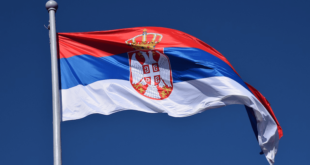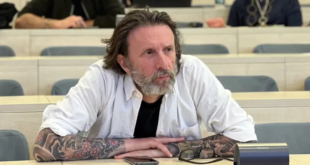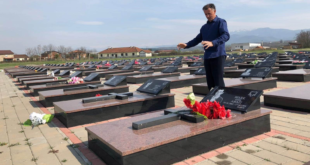MITROVICA, Serbia – There are some new faces in the Serb-controlled slice of northern Kosovo, the breakaway province where 2 million Albanians will declare independence from Serbia within days.
They stand in small groups at road junctions in Mitrovica and the main bridge that crosses the River Ibar to the Albanian half of the dusty former mining town — within sight of French peacekeepers behind sandbags on the roof of the Cultural Centre.
“New faces” has become a common euphemism for Serb undercover security in Mitrovica, Kosovo’s second city and a flashpoint for Serb-Albanian unrest since the 1998-99 war and withdrawal of Serb forces under NATO bombs.
“We’re all Serb policemen, if you want to put it like that,” said Boris, a 29-year-old “security officer” at the hospital in north Mitrovica. “If they (Albanians) want to take the north by force, we’ll defend ourselves. Serbs are ready.”
It’s the kind of rhetoric that threatens to spoil the party penciled in for Sunday, when Kosovo’s 90-percent Albanian majority is expected to declare independence and end nine years of limbo and uncertainty.
The declaration in the capital Pristina will stretch as far as the hamburger stand on the Mitrovica bridge. Everything further north is controlled by Belgrade, 10 percent of Kosovo’s territory and home to 50,000 Serbs who will reject secession and set up their own parliament.
Partition is the reality on the ground, regardless of its rejection by Western powers who stand ready to recognize Kosovo within hours of it striking out alone. With Serbia’s backing, the north will test Western resolve to keep Kosovo whole.
STAND-OFF
“This must be treated as a marathon, rather than a sprint,” said one Western official. “It’s a stand-off. But stand-offs can be very dangerous.”
Backed by Belgrade, northern Kosovo has frustrated attempts by the United Nations to extend its authority over the entire territory of Kosovo since NATO bombed Serbia in 1999 to halt the killing and ethnic cleansing of Albanians.
With their backs to central Serbia, the north Kosovo Serbs enjoy a level of security and freedom that is the envy of their 60,000 kin scattered in isolated enclaves south of the Ibar. NATO’s 16,000-strong peace force is braced for unrest, and U.N. agencies have contingency plans for thousands of refugees.
The European Union is preparing to take over supervision and policing of the new state, but Western diplomats say it will have its work cut out trying to re-integrate the north.
With Russia blocking adoption of a new U.N. Security Council resolution on Kosovo, Serbia can cling to Resolution 1244 which it argues guarantees Serbian sovereignty over the province.
Civil disobedience is certain, violent resistance possible if Serbs in the north see independence being imposed upon them. “We will have to tread softly,” said the Western official.
It remains to be seen how far Serbia might go in trying to formally prise away the north, but Belgrade officials are promising to extend a network of “parallel structures” providing schooling, health and administrative services for Kosovo Serbs.
NATO officials admit unrest in Mitrovica could spark Albanian attacks on Serb enclaves in a repeat of 2004 riots that killed 19 people. Some Serbs talk of leaving.
“I hope to stay, I plan to stay, at least for as long as I can live here,” said a Serb professor traveling by train from Kosovo Polje near Pristina to work in north Mitrovica.
“But this is the kind of place where if it’s good just for one side, there can’t be peace.”
 Eurasia Press & News
Eurasia Press & News



